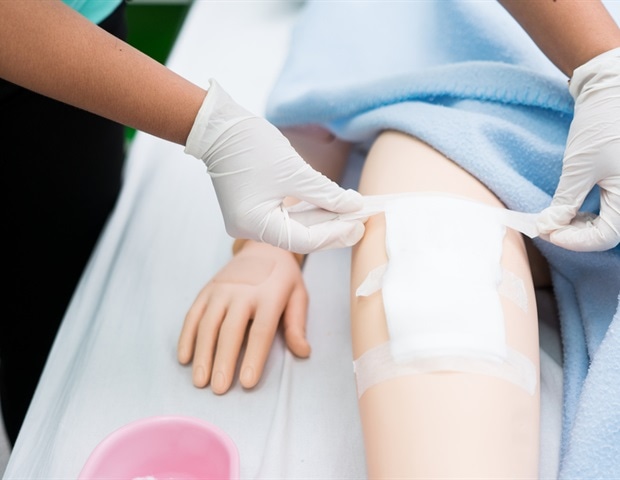SOLASCURE Ltd (SolasCure), a biotechnology company developing a hydrogel containing tarumase (provisional INN), a recombinant enzyme derived from maggots, and which aims to accelerate wound debridement and contribute to wound bed preparation & healing, today announced the results of its proof-of-concept, first-in-human, Phase IIa safety study. The CLEANVLU trial evaluated the Company’s first investigational product, Aurase Wound Gel, for use in chronic venous leg ulcer patients over 12 applications of the product (dosed every 3 days).
SolasCure’s CLEANVLU Phase IIa clinical trial observed a strong safety profile for Aurase Wound Gel, with no evidence of systemic availability, no antibody generation to the enzyme and no effects on systemic coagulation pathways. In addition, no local tolerability issues (erythema, oedema, induration, or bleeding) and no pain from application of the gel was observed. The trial also indicated a dose-dependent effect on wound debridement with higher concentrations of enzyme resulting in more complete debridement, a faster rate of debridement, and an improved wound healing trajectory. The study was performed at centres in the US, UK, and Hungary.
SolasCure’s Aurase Wound Gel, a hydrogel containing an enzyme cloned from medical maggots, aims to facilitate debridement, reduce bacterial biofilm, and promote wound bed preparation and healing. Aurase Wound Gel is due to enter further Phase II trials to further evaluate its efficacy across a larger and more diverse patient group than the Phase IIa study, with the positive safety data obtained from the Phase IIa trial allowing for higher concentrations of the gel to now be explored.
Chronic wounds are a huge unmet medical need with treatment costs accounting for approximately 1-3% of total healthcare expenditure in developed countries.1 With over 40 million chronic wounds requiring debridement each year globally, the need for better debridement, wound bed preparation and healing is a growing and urgent problem, currently without safe, pain-free, and effective solutions.
Strengthening SolasCure’s leadership team as it moves towards further Phase II clinical trials, medical expert Andy Weymann has been appointed as Chairman of the Board.
Andy Weymann M.D., newly appointed Chairman of the Board, SolasCure, said: “I am delighted to join the SolasCure team, especially at such an exciting phase of growth. The positive safety and proof-of-concept data from the Phase IIa trial represents a huge milestone for the Company, accelerating its mission to provide a disruptive wound care product that could significantly improve outcomes for patients with chronic wounds globally. I look forward to working alongside the team as we now focus on developing the efficacy of Aurase Wound Gel in subsequent Phase II trials.”
Andy Weymann is an orthopaedic surgeon with 25 years’ experience in the medical device and regenerative medicine industries. Andy has held several global executive and Board roles throughout his career, including Chief Medical Officer and Senior Vice President of Scientific, Clinical and Medical Affairs at Smith+Nephew. Andy completed his Masters in Human Medicine at the University of Zurich, Switzerland, an MBA at the Simon Business School, University of Rochester, NY, and his Board Program at Harvard, Boston, MA.
Rob Kirsner, M.D., PhD, Head of Medical Advisory Board at SolasCure, Chairman and Harvey Blank Professor of Dermatology at the University of Miami, added: “SolasCure’s Aurase Wound Gel is an innovative technology, harnessing an enzyme cloned from medical maggots to accelerate wound cleaning, and therefore healing. We have a shared vision to deliver a meaningful solution for patients with chronic wounds, and the positive data observed in the CLEANVLU Phase IIa trial brings us another step closer.”
Further validating SolasCure’s innovative approach to wound care, the Company was recently selected for the EIC Accelerator Horizon grant which recognises the potential impact the innovative technology could have on the lives of patients suffering from chronic wounds without adequate solutions.
For more information about SolasCure, please visit: https://solascure.com/.
- Olsson, M. et al. (2018) ‘The humanistic and economic burden of chronic wounds: A systematic review’, Wound Repair and Regeneration, 27(1), pp. 114–125. doi:10.1111/wrr.12683.
